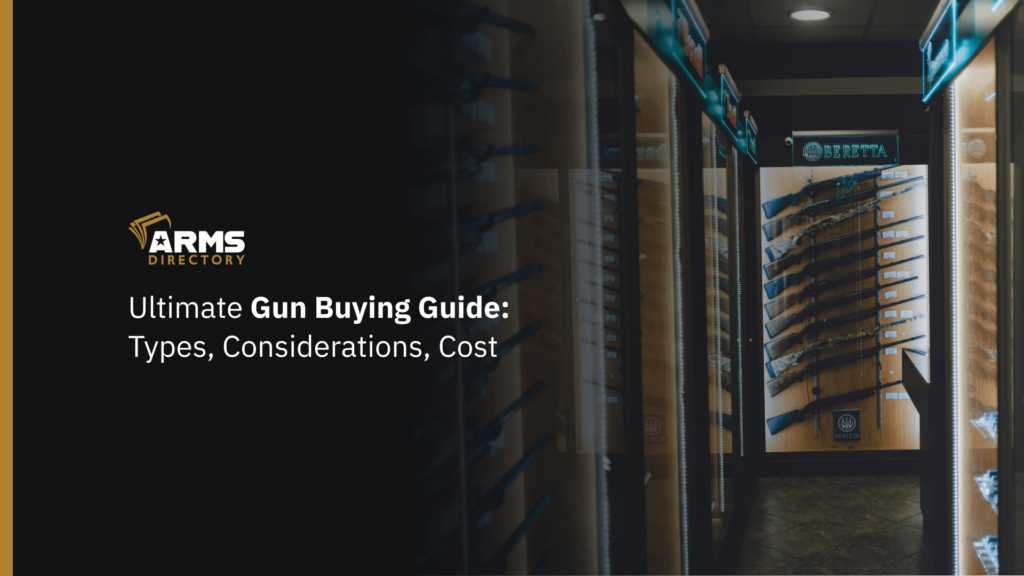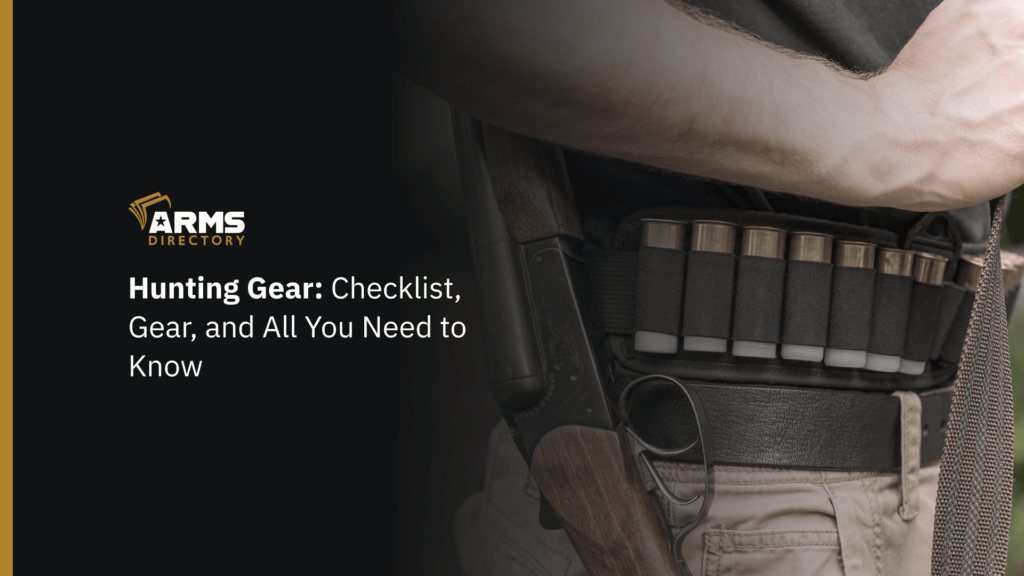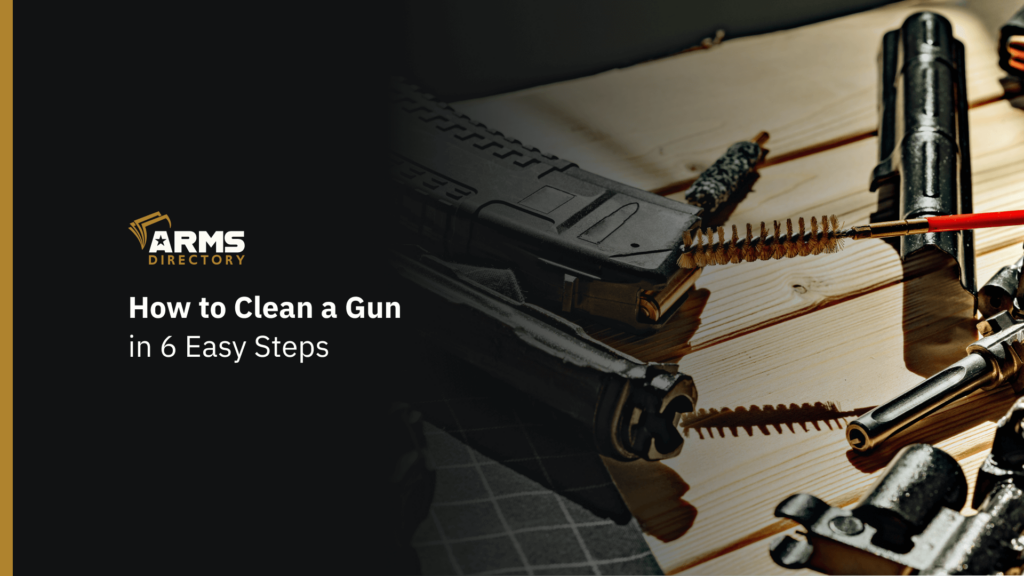
How to Clean a Gun in 6 Easy Steps
Everything needs proper maintenance. You need to clean your computer from time to time, wipe the dust out of household furniture, wash your car… it’s the same with firearms. Cleaning your gun shows that you respect it, and want it to work properly for a long time.
Even though maintaining a gun is a process that might seem obvious to long time gun owners, to newer owners it might not be that clear.
Today, we are going to review – how to clean and maintain your firearms, how often it should be done, and why it should be done.
Why Should You Clean Your Firearm?
First off, you need to understand why it is so important to regularly clean your firearm. You see, it is not about making it shiny, it is about performance, and your own safety while using it.
Over time, your gun accumulates dirt and gunpowder residue. It can also become rusted and corroded inside the barrel. This not only affects the performance and accuracy of your weapon, it makes it unsafe and unpredictable.
Proper maintenance of your gun also allows you to increase the longevity of your weapon, and prevent common issues like failing to fire or failing to feed.
How to Clean a Gun: 6 Easy Steps
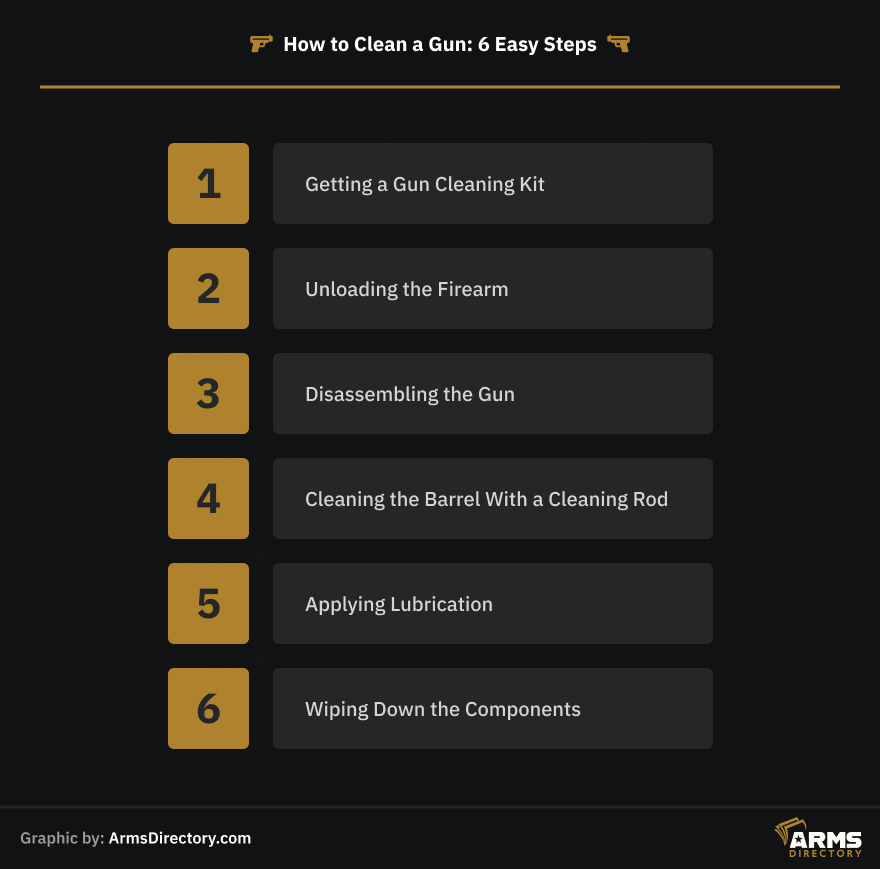
- Getting a Gun Cleaning Kit
- Unloading the Firearm
- Disassembling the Gun
- Cleaning the Barrel With a Cleaning Rod
- Applying Lubrication
- Wiping Down the Components
1. Getting a Gun Cleaning Kit
Before you start cleaning your gun, you must be properly prepared. This means getting a gun cleaning kit, either pre-made or one that you assemble yourself.
Here are the components you will need:
- Lubricant (gun oil)
- Cleaning rods
- A nylon cleaning brush
- Flashlight
- Cotton swabs
- Microfiber cloths
- Patch holder and patches
- A Bore brush
- Cleaning solvent
If you are wondering how to clean a gun with household items, although not recommended, you can use kerosene and/or mineral spirits as a lubricant. Next, you can use a metal rod with a small square soft/microfiber cloth wrapped around it and some cotton tips.
Related Post : The Ultimate Shooting Accessories for Every Weapon [A 2023 Beginners Guide]
2. Unloading the Firearm
Always make sure to properly unload your firearm, and double-check that it is unloaded before you start cleaning it. Do not forget to inspect the barrel to see if there is a round there ready to fire that you forgot about.
It is imperative that you verify that no ammunition remains inside the chamber or in the barrel. Only then will you be able to consider the gun fully unloaded.
3. Disassembling the Gun
Check the manufacturer’s recommendations on disassembly. For instance, rifles and semi-automatic pistols will generally need to be stripped to their major components i.e. the barrel, slide, guide rod, frame, and magazine.
On the other hand, revolvers and shotguns do not need to be stripped down to clean them. Unless, of course, you want to repair it.
4. Cleaning the Barrel With a Cleaning Rod
Next, you need to clean the inside (bore) of your gun with a cleaning rod. It would be best if you could start from the back of the bore.
If you cannot, you should use a muzzle guard, so that the cleaning rod does not bang against the muzzle. This could cause your gun to malfunction.
In order to thoroughly clean the barrel, take a cleaning patch soaked in solvent, and push it until it comes out of the other end of the bore. Make sure not to pull the dirty patch back through the barrel you just cleaned.
Wondering how to know whether your gun is clean or not? A good way is to simply observe the amount of dirt that comes off with each swipe. Once you notice your cleaning patch comes out clean, then you can carry on to the next step.
5. Applying Lubrication
Attach a cotton mop to your cleaning rod, or, if you are using a household item, cotton balls. Then make sure to run it through the bore, leaving a light coating of gun oil on the inside.
Next, you should apply solvent to your gun brush and then brush all parts of the action with it. Use only a small amount. Too much can attract debris and cause it to become sticky. You want just enough of a light coating to prevent this area from rusting.
6. Wiping Down the Components
Last, but not least, you need to wipe all the components down well. You can use a luster cloth, or a soft/microfiber cloth if you are cleaning with household materials.
As a side note, if you do not have a dedicated cloth for gun cleaning, you can use an old t-shirt or a clean pair of old socks. Practically, any piece of cloth lying around, that you do not intend on using again, and that is clean, will do the job.
This will take care of any remaining debris, including the acid from fingerprints. It will also make your weapon nice and shiny.
After you have wiped down everything, you can reassemble your firearm. Carefully inspect each part for any damage you may have missed, and make sure all the parts are in their correct positions.
How Often Should I Clean My Gun?
Another important aspect you need to consider is the frequency at which you need to clean your gun.
As a general rule of thumb, the best practice is to clean your firearm after every time you use it, and clean it more thoroughly once a month. It is a good habit to clean your firearms regularly.
Defensive guns, which do not get used that often, also need to be cleaned from time to time. When it comes to hunting rifles – they do not require cleaning that often. At the very least, make sure to clean them before the start of the hunting season.
Bonus Tips for Cleaning Guns
- When you are not using your gun, always store it in the proper case. A protective gun case will ensure that your weapon is kept clean, dry, and safe.
- Most gun cleaning products contain harmful chemicals that can damage both your skin and surfaces, so always make sure to use proper protective equipment.
- Always clean your guns in areas that are well-ventilated. Solvent fumes are toxic and can make you sick. Additionally, lubricants and solvents have a harsh chemical smell that lingers after every use. This is why it’s generally recommended to do this procedure outdoors or in a well ventilated space like your garage.
- After you are done cleaning your gun, do not forget to wash your hands and wipe down your work surface well with a clean cloth, in order to remove any leftover heavy metals such as lead or chromium particles.
- Unless it is absolutely necessary, avoid using motor oil to lubricate your barrel. It is best to use a product specially designed for firearms. Motor oils might be good at minimizing friction, but they also contain hazardous materials that could easily spread to your holster, gun case, and so on.
Final Words
You have finally made it to the end of the article! That means you are now aware how important it is to clean and maintain your firearms. As you can see, it is also not that complicated of a process either. In fact, if you start cleaning your gun regularly, it becomes not only second nature but an excellent habit that every skilled gun owner should possess.
Remember, a clean gun is safer to use, more reliable, and has better accuracy. It also improves the performance and longevity of the firearm.
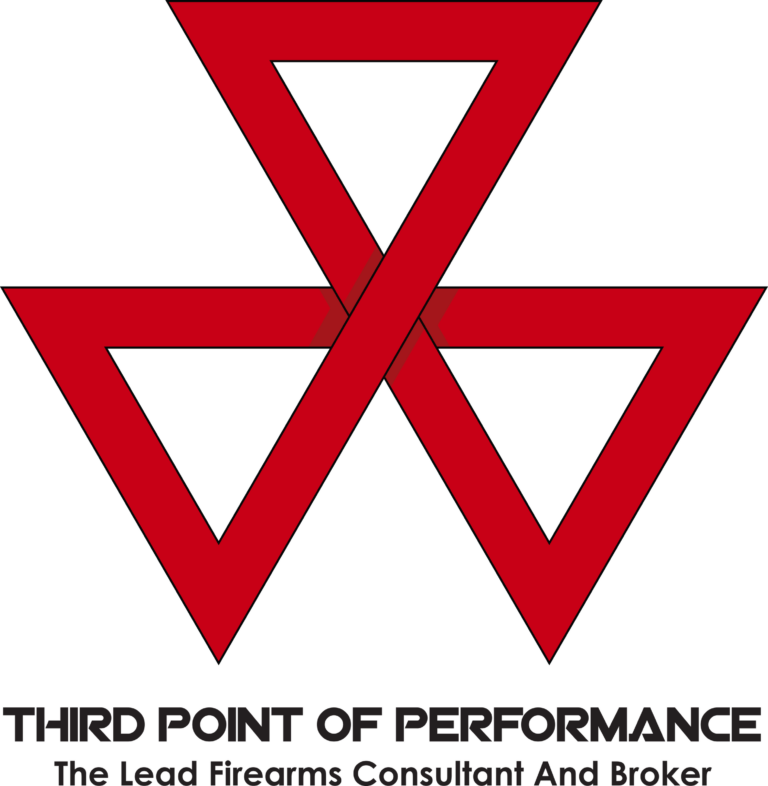

![The Ultimate Shooting Accessories for Every Weapon [A 2023 Beginners Guide]](https://vault.armsdirectory.com/wp-content/uploads/2023/08/30071223/The-Ultimate-Shooting-Accessories-for-Every-Weapon-A-2023-Beginners-Guide-1024x576.png)
